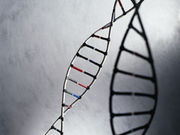Expanded screening modeled more hypothetical fetuses at risk for severe or profound conditions
TUESDAY, Aug. 16, 2016 (HealthDay News) — Compared with current recommendations from professional societies, expanded carrier screening may increase the detection of carrier status for potentially serious genetic conditions, according to a study published in the Aug. 16 issue of the Journal of the American Medical Association.
Imran S. Haque, Ph.D., from Counsyl in South San Francisco, and colleagues conducted a retrospective modeling analysis of results from expanded carrier screening in reproductive-aged individuals with no known indication for specific genetic testing. Data were included for 346,790 individuals.
The researchers found that the calculated frequency of fetuses potentially affected by a profound or severe condition varied among major U.S. racial/ethnic categories, from 94.5 per 100,000 for Hispanic couples to 392.2 per 100,000 for Ashkenazi Jewish couples. Expanded carrier screening modeled more hypothetical fetuses at risk for severe or profound conditions in most racial/ethnic categories, compared with screening based on current professional guidelines. For Northern European couples, the two professional guidelines-based screening panels and expanded carrier screening modeled 55.2 and 159.2 hypothetical fetuses affected per 100,000, respectively. Guideline-based screening varied from identification of 6 to 87 percent of hypothetical fetuses affected for East-Asian and African or African-American couples, respectively, relative to expanded carrier screening.
“Prospective studies comparing current standard-of-care carrier screening with expanded carrier screening in at-risk populations are warranted before expanded screening is adopted,” the authors write.
Several authors disclosed financial ties to biopharmaceutical companies, including Counsyl, a laboratory providing expanded carrier screening.
Copyright © 2016 HealthDay. All rights reserved.








